- Main page
- Interviews
Foreigner-friendly universities and schools recognized
October 2, 2017
The Japan Ryugaku (a Japanese word meaning "study abroad") Awards grand prizes have been conferred on 10 Japanese universities and vocational schools in 10 different categories for the excellence of their academic programs for non-Japanese students, as well as their work in helping students find jobs in Japan.
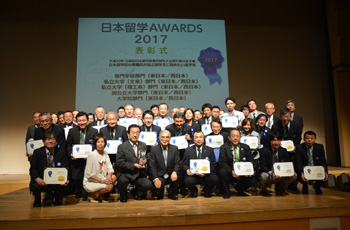
Awards winners pose at the ceremony at the National Olympics Memorial Youth Center in Tokyo's Shibuya Ward on Aug. 7 in Tokyo.
COMMITTEE OF JAPAN RYUGAKU AWARDS
The award ceremony was held at the National Olympics Memorial Youth Center in Tokyo's Shibuya Ward on Aug. 7, and was attended by people working for Japanese universities and Japanese language schools, and other people in related businesses. The Association for the Promotion of Japanese Language Education organizes the annual awards and Japanese language schools select the winners.
"The purpose of the awards is to inform the world of the value of studying in Japan," said Hiroko Yamamoto of the Committee of Japan Ryugaku Awards, who is also the director of Kai Japanese Language School.
In explaining the nomination and winner selection procedures, she said the award committee used online questionnaires and required respondents to give their names so that they could submit responsible answers.
Among the award-winning criteria for universities and vocational schools are providing easy-to-understand information, abolition of the guarantors living in Japan (in case students fail to pay tuition, etc.) requirement, great support system to help students find jobs in Japan and excellent language learning curriculum.
The annual award ceremony was the sixth and The Japan Times provided support for the first time this year. The ceremony also had 28 other supporters, including JR Tokai Tours, Flywire, Sakura House and Asahi Kasei Amidas, among others. The Association for the Promotion of Japanese Language Education came up with the idea of creating the awards to boost the number of students from overseas because many international students left Japanese language schools and returned home after the earthquake and tsunami disaster in March 2011
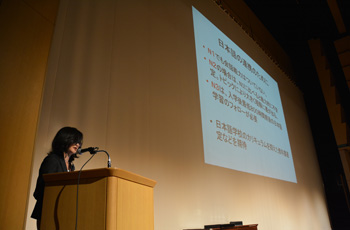
Hiroko Yamamoto of the Committee of Japan Ryugaku Awards, speaks in the beginning of the award ceremony.
COMMITTEE OF JAPAN RYUGAKU AWARDS
The awards are given to five types of schools or school departments in East Japan and five types in West Japan. The types of schools or departments are senmon gakko (vocational schools), bunkei (humanities, social studies, literature, etc.) departments of private universities, rikei (science, math, engineering, etc.) departments of private universities, public universities and graduate schools.
This year, 175 Japanese language schools across Japan submitted 445 votes to select 53 schools in the 10 categories.
Five schools, universities and university departments were selected as award winners in each of the 10 categories. At the ceremony, one from the five was selected for the grand prize.
The grand prizes for "Senmon Gakko in East and West Japan" went to Tokyo International Business College and Tsuji Culinary Institute, respectively. Toyo University and Yokkaichi University took the prize in the category of bunkei departments of private universities in East and West Japan, respectively.
Ashikaga Institute of Technology and Fukui University of Technology won the grand prizes in the category of rikei departments of private universities in East and West Japan, respectively. The public university category prizes went to Yokohama National University, East Japan, and Nagoya University, West Japan.
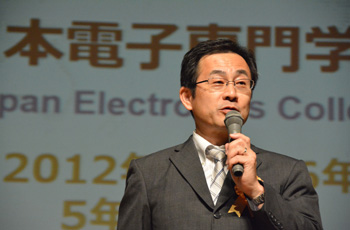
Toshikuni Koga, president of Japan Electronics College.
COMMITTEE OF JAPAN RYUGAKU AWARDS
The grand prize winner of the graduate school category in East Japan was Waseda University's graduate school while in the West, the Japan Advanced Institute of Science and Technology took home the prize.
To honor schools that have won the grand prize five years in a row, the award committee inducts them into the Hall of Fame. Schools in the hall will not be nominated for the awards for the next three years.
This year, Waseda University's graduate school entered the Hall of Fame. It is the second school to be awarded such status after the Japan Electronics College won the grand prize last year for the fifth straight time.
"This is such a wonderful prize. We are very grateful. Thank you so much," said Tetsuya Yamada of the Center for International Education, Waseda University. "Waseda has 50,000 students, 7,000 of whom are from overseas. We want to increase that to 10,000 in the near future and lead Japan in accepting international students."
Toshikuni Koga, president of Japan Electronics College, also spoke at the ceremony.
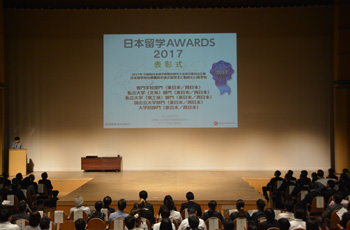
The event emcee speaks to the audience.
COMMITTEE OF JAPAN RYUGAKU AWARDS
"It is a great honor to be in the Hall of Fame. Some 94.7 percent of our international students find jobs in Japan, the same ratio as Japanese students. But we shall never be satisfied and will continue to do our best in educating students," Koga said. The award ceremony had two guests from the government.
Maki Okada, Student Support and Exchange Division, Higher Education Bureau, the Ministry of Education, Culture, Sports, Science and Technologies, said, "Thank you very much for inviting me and congratulations to all the prizewinners. We will try our best to realize our target of 300,000 international students a year coming to Japan."
Shunichi Amada, who is in charge of making use of talented people from overseas in the Industrial Structure Policy Division, Economic and Industrial Policy Bureau of the Ministry of Economy, Trade and Industry, said, "It is very important for us to have a solid system in place so that we can accept more students from other countries."
The award ceremony is also an opportunity for Japanese language schools to submit their requests to universities and various schools accepting their alumni. Such requests include informing the language schools of what their alumni do after graduation, keeping them up to date with the academic results and class attendance ratio of their alumni, providing more-detailed information on entrance exams and screening for entrance, and increasing the number of new students to be accepted in October.
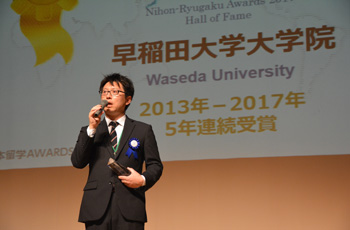
Tetsuya Yamada of the Center for International Education, Waseda University.
COMMITTEE OF JAPAN RYUGAKU AWARDS
One Japanese language school noted a recent increase in the number of Vietnamese students and thus requested more school entrance application forms in Vietnamese. Another complained that some overseas students give up going to universities and other schools because of financial restraints, and thus requested improvements in financial aid in general.
2017 Ryugaku Award winners
• Hall of Fame (Schools that have won grand prizes for five consecutive years)
Japan Electronics College (inducted last year)
Waseda University's graduate school (inducted this year)
• Grand prize winners (10 schools)
Senmon gakko (vocational schools) category
Tokyo International Business College, Tsuji Culinary Institute
Private university bunkei (humanities, social studies, literature, etc.) category
Toyo University, Yokkaichi University
Private university rikei (science, math, engineering, etc.) category
Ashikaga Institute of Technology, Fukui University of Technology
Public university category
Yokohama National University, Nagoya University
Graduate school category
Waseda University's graduate school, Japan Advanced Institute of Science and Technology
• Award winners (53 schools)
Senmon Gakko (vocational schools) category
Tokyo International Business College, Chuo Computer & Communication College, Nihon Kogakuin College, Hiko Mizuno College of Jewelry, Hospitality Tourism Technical School, ECC Kokusai College of Foreign Languages, Osaka YMCA International College, Syusei Technical College, Ehle Institute, Tsuji Culinary Institute
Private university bunkei (humanities, social studies, literature, etc.) category
Seigakuin University, Takushoku University, Toyo University, Hosei University, Waseda University, Osaka Seikei University, Kwansei Gakuin University, Nagoya University of Economics, Yokkaichi University, Ritsumeikan University
Private university rikei (science, math, engineering, etc.) category
Ashikaga Institute of Technology, Shibaura Institute of Technology, Tokyo Denki University, Tokyo University of Science, Waseda University, Kindai University, Chubu University, Fukui University of Technology, Meijo University, Ritsumeikan University
Public university category
Saitama University, Tokyo Metropolitan University, Chiba University, Tsukuba University, Tokyo Institute of Technology, Yokohama National University, Osaka University, Osaka City University, Osaka Kyoiku University, Shizuoka University, Nagoya University
Graduate school category
Chiba University's graduate school, Tsukuba University's graduate school, Hitotsubashi University's graduate school, Musashino Art University's graduate school, Meiji University's graduate school, Yokohama National University's graduate school, Waseda University's graduate school, Osaka City University's graduate school, Kansai University's graduate school, Kyoto University's graduate school, Nagoya University's graduate school, Japan Advanced Institute of Science and Technology
